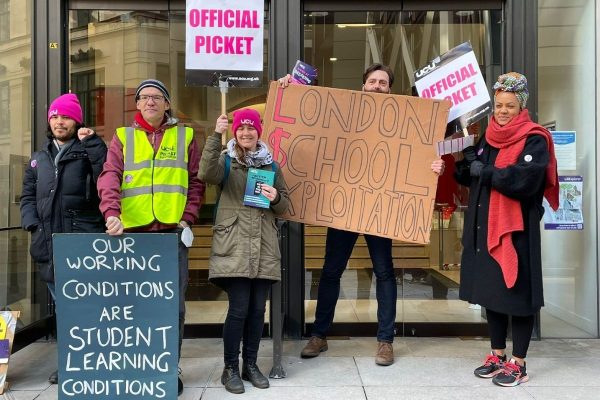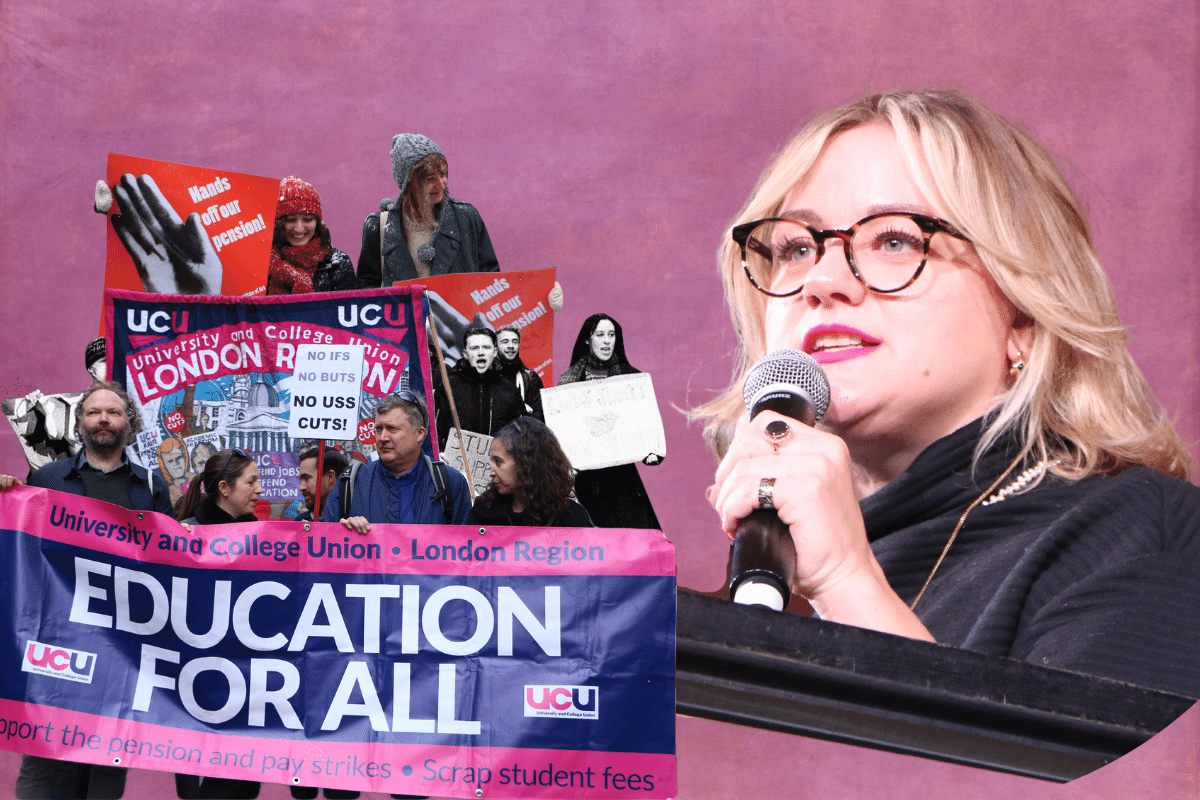Wednesday 22 March marked the last day of planned strike action by the UCU for this semester.
Facing intransigence from the bosses, these next few weeks – leading up to mid-April – were originally supposed to be a period of preparation, ahead of the escalation to a historic marking and assessment boycott across 150 universities.
Instead, general secretary Jo Grady, who has been at odds with the democratically-elected Higher Education Committee (HEC) since October, has thrown the entire union into a state of confusion.
She has waged a top-down campaign, across all official union channels, to try and prettify a few slight concessions from the bosses – particularly in relation to pensions – as ‘wins’.
This stems from her apparent belief that the union cannot survive a direct fight with the employers. In effect, UCU members are told that we cannot win anything but the crumbs that they offer us. Or, to put it frankly, the promise to talk further about the details of potential crumbs!
Sabotage and splits
Unfortunately, similar behaviour has been prevalent throughout this dispute: blocking the decision by the HEC to escalate to indefinite action; waging public scare campaigns in full view of the employers; browbeating members to back the leadership’s strategy; and unilaterally pausing strikes for two weeks at the behest of the bosses.
This latter move resulted in the University and Colleges Employers Association (UCEA) imposing their real-terms pay cut onto the entire sector, with no commitment on workloads, pay gaps, or anti-casualisation.
In fact, the pay offer had not substantially improved from that which members had rejected by 80.4% just six weeks ago. This deal was actually so bad on pay that Unison agreed “not to waste members time with another consultation”.
It represents no substantive improvement on the original pay offer, so our the Higher Education Service Group Executive have decided not to waste members time with another consultation, and move directly to a strike ballot. We will be recommending that you vote yes for action.
— UNISON in Higher Education (@UNISONinHE) March 15, 2023
In contrast, the UCU leadership claimed to have won the abolition of zero-hour contracts in the sector. The statement, however, leaves clear room for the employers to justify such contracts on a local basis, with only a recommendation coming from UCEA to “take action” on their use.
In the main, all that we have from the employers is a vague promise for further talks on many of these issues.
Members after yesterday’s announcement: “FFS, stop the hyperboles! Treat us like adults and tell it like it is”
Jo Grady this morning: “this is one of the biggest wins in UK trade union history”.
LOL.#UCU #ucuRISING #UCUstrike https://t.co/8RhEqdzSXF
— Mario Prost (@MarioProst1) March 16, 2023
This was a deal hand-crafted by the bosses to split our union’s membership – and our disputes – in two: between senior lecturers and casualised members; and between members at pre-92 institutions who are in the USS pension scheme, and post-92 members who are not.
UCEA’s statement this week also confirmed that this ‘offer’ was nothing but a threat by the employers. Any negotiations on working conditions, they said, would only continue “on the understanding that no further industrial action, including ASOS, is called during these talks”.
In other words, we would have to tie our hands behind our backs before negotiators can enter the ring.
Branch delegates meeting
 Our leadership should have straight away rejected these so-called ‘offers’; clarified to members that the fight is very much still on; and started preparations for strike action and the marking boycott.
Our leadership should have straight away rejected these so-called ‘offers’; clarified to members that the fight is very much still on; and started preparations for strike action and the marking boycott.
Instead, a series of e-ballots were sent out, containing single-option questions, designed to get the preferred result. One such question asked members if they wanted to be formally consulted on the ‘offers’ and pause the strike action – with no available option to see and discuss the offer before deciding on a potential pause.
This is yet another example of bureaucratic manoeuvring disguised as democratic procedure.
Similarly, elected negotiators have not been part of the ACAS negotiations, and increasingly seem as if they are being left out of the process.
Instead of discussing the inadequacy of the offer on the table, and talking about how to fight for a better one, the union is battling over procedural questions.
Accompanying this online ballot came bombastic messaging blasted across all platforms, with Grady making grossly-exaggerated claims about the ‘offers’ received.
The leadership then decided to hedge their bets by calling a national branch delegates meeting (BDM), with less than 24-hours notice, where delegates were only allowed to vote on the same rigged question.
When officials tried to claim that the question couldn’t be altered, the meeting exploded in anger. This protest was a success, forcing the questions to be voted on separately.
The BDM voted narrowly for sending the offers out to members, with 52% in favour of consulting members and 32% opposed. On pausing strike action, there was a storming vote against by 70% to 16%.
Subsequently, in a further online survey of 32,000 members, a strong majority expressed a desire to be consulted over the UCEA’s proposals. As in the ongoing NEU and NHS disputes, many ordinary members will want to express their rejection of these rotten ‘offers’.
Rank-and-file control
 The HEC met after the BDM, and voted not to send the offers out and to continue action.
The HEC met after the BDM, and voted not to send the offers out and to continue action.
The thought process behind this decision is understandable. The leadership has proven its lack of respect for democracy; its willingness to use leading questions; its support for folding down action despite no concrete promises; and its lack of faith in our ability to win even an inflation-level pay rise.
Given all this, sending such ‘offers’ out to members at this stage would likely lead to the union being torn in two, putting the final nail in the coffin for the dispute.
What is missing in this standoff between UCU HQ and the HEC is the genuine, mass, democratic involvement of the membership. Whilst decisions are made at the top, grassroots members are largely left in the dark.
To break the logjam, and take the struggle forward, rank-and-file members must be put in control of the dispute, on the basis of mass participation and proper democratic debate.
The upcoming Special Higher Education Sector Conference – with accompanying emergency general meetings of branches to elect local delegates – is a step in the right direction. In its current form of a three-hour online webinar, however, this meeting has its limits.
And it does not resolve the key question in this struggle: the lack of fighting leadership.
Need for fighting unions
The UCU leadership has shown that they do not believe that we can take on the bosses directly.
Indeed, they seem to be so terrified of this prospect that they are willing to trample over union democracy and engage in the bullying of their own membership on social media. They present every sabotage as democratic, and every act of division as for the sake of unity.
All the while, they put forward a positive spin on the negotiations. This is met only with consternation by rank-and-file members, who have seen this struggle demobilised too many times.
Now they are framing their strategy as a case of “banking” so-called “concessions”, and “building” for an indeterminate next stage in the dispute. Meanwhile, the employers attack us relentlessly.
At root, this stems from their timid, reformist outlook. Jo Grady, the full-time staff, and their cheerleaders in the UCU Commons faction all hark back to the ‘respectable’ unionism of the past period.
They see strikes as a way for members to let off steam; a brief flexing of the union’s muscles, which might help them squeeze an extra couple of percent out of the bosses through ‘clever’ negotiations or ‘new’ strategies.
In the face of a deepening capitalist crisis, this outlook completely breaks down. Even formerly ‘privileged’ sectors like higher education are now being eroded and dismantled.
The capitalist class cannot offer any meaningful reforms. Instead, they are forced to go on the attack to protect their profits.
In response, workers across the board are moving into action. In this process, we must fight to transform our unions into militant weapons, which are capable of going on the offensive and forcing the employers to retreat.
Kick capitalism out of education!
 Whatsmore, to give members confidence to continue the struggle, we need to be clear not just about what we’re against, but what we are fighting for.
Whatsmore, to give members confidence to continue the struggle, we need to be clear not just about what we’re against, but what we are fighting for.
This means waging a struggle that goes beyond addressing the symptoms of marketisation, but which tackles the problem at its roots: the capitalist system.
Indeed, such a campaign would have to involve not only the UCU, but all our sister unions in higher education, alongside students as well.
To this end, Socialist Appeal activists recently put forward a motion at the University of Sheffield UCU branch, calling to ‘kick capitalism out of higher education!’ This passed, and will now be discussed at the upcoming UCU Congress in May.
If successfully voted on there, this would commit our union to explicitly fighting for: a reversal of funding cuts; an abolition of tuition fees; and staff and student control over the running of universities.
This points the way forward out of the current deadlock between the union’s reformist leadership, who seem happy to manage the decline of higher education, and the rank and file who are fighting for a real transformation of the sector.
UCU HE Sector Conference motion: Kick capitalism out of higher education!
Notes:
- The increasing role of privatisation, profit, and the market in higher education (HE).
- Alongside this, we have seen increasing attacks on pay and pensions, rampant casualisation and outsourcing, course closures and redundancies, and systemic pay inequality.
Believes:
- This marketisation of HE and, ultimately, capitalism itself are the driving forces behind these issues that are proliferating throughout our sector.
- The only way to achieve lasting change is to tackle the root causes of these issues plaguing our sector and to fight for free, fully-funded HE.
Resolves:
- To launch a sector-wide campaign to ‘kick capitalism out of HE’, and call for sister unions and students to join this.
- This campaign should have the explicit goal to reverse all funding cuts; abolish tuition fees; kick out private companies and interests; and replace university bureaucracies with democratic bodies made up of HE staff and students to run universities for social good, not profit.






